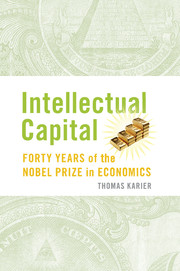Book contents
- Frontmatter
- Contents
- Preface
- Economic Nobel Laureates
- 1 An Economic Prize
- 2 Free-Market Economics
- 3 Micro: The Chicago School
- 4 Stock Market Casino
- 5 More Micro
- 6 Behaviorists
- 7 Keynesians
- 8 Classical Revival
- 9 Inventors
- 10 Game Geeks
- 11 General Equilibrium
- 12 A World View
- 13 Numbers Guys
- 14 History and Institutions
- 15 Reshaping the Prize
- Notes
- Index
- Frontmatter
- Contents
- Preface
- Economic Nobel Laureates
- 1 An Economic Prize
- 2 Free-Market Economics
- 3 Micro: The Chicago School
- 4 Stock Market Casino
- 5 More Micro
- 6 Behaviorists
- 7 Keynesians
- 8 Classical Revival
- 9 Inventors
- 10 Game Geeks
- 11 General Equilibrium
- 12 A World View
- 13 Numbers Guys
- 14 History and Institutions
- 15 Reshaping the Prize
- Notes
- Index
Summary
There may have been only three Russian Nobel winners in economics, but their contributions have been substantial on three critical concepts: gross domestic product, input-output analysis, and linear programming. Two of these important tools were developed in the 1930s by Nobel Prize winners from Harvard University. The first, Simon S. Kuznets, developed the United States' system of national income accounts that included the familiar measure of economic performance, gross domestic product. Without this widely used measure, we would have very little understanding of how well the economy is performing or how fast it is growing. Other economists made contributions to this effort, including the English Nobel laureate Sir Richard Stone, but it was Kuznets who provided the grand design. The second Russian Nobel Prize winner was Wassily W. Leontief who invented one of the premier economic planning tools called input-output analysis. First devised in the 1930s, input-output models continue to be used throughout the world to provide answers to interesting and important economic questions.
These two Nobel economists had something else in common; they were both obsessed by economic data. Kuznets started his investigations by collecting information about economic performance for the U.S. economy in order to track the important but poorly understood business cycles. All of this information had to be collected, categorized, and analyzed. Similarly, Leontief started with the tedious task of collecting information about interindustry sales, that is, the sales of one industry to another, and ultimately to consumers.
- Type
- Chapter
- Information
- Intellectual CapitalForty Years of the Nobel Prize in Economics, pp. 172 - 192Publisher: Cambridge University PressPrint publication year: 2010

